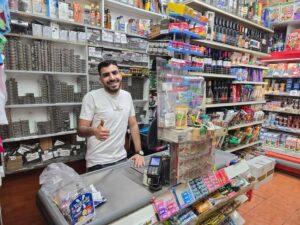“Let me ask you a question,” said Dr. Shimon Azoulay to the audience of hundreds sitting before him.
“If you won the lottery, would you be happier?” Everybody nodded. “And if you were in a horrible accident that put you in a wheelchair for the rest of your life, would you be happier?” Obviously, everybody shook their heads.
Dr. Azoulay continued: “I know it sounds unbelievable, but you are all wrong. After the initial acclimation process, after winning the lottery or becoming a paraplegic, most people do not experience a significant difference in their level of happiness.
“In the beginning, you would feel intense emotions, either intense happiness or intense sadness. But it’s similar to what happens after buying a new car. For the first few days, you bark at your kids – ‘No eating in the car!’ or “No leaving stuff in the car!’ but after two months the whole car is full of crumbs…So, what happened? You went back to your daily routine; you got used to your new normal.
“And what determines our quality of life is not those spectacular, extraordinary moments, but rather our day-to-day life with all its nitty-gritty details. This is why one of the greatest dangers facing at-risk youth is their lack of regularity; the disintegration of daily routine.
Dr. Azoulay knows all about the disintegration of one’s daily routine. He grew up as the youngest of his family in a poor neighborhood in Hadera. His father, an immigrant from Morocco, passed away when Azoulay was only three years old. Today, he holds a Ph.D. in philosophy, is a lecturer at the Hebrew University, and is recognized as an expert in education. I felt that his words needed to reach beyond the hall where he was lecturing this week when he met with employees of Keren Cherut’s “Thriving Together” program, which empowers youth from Israel’s development towns.
“Here’s the secret,” Dr. Azoulay told them, “when I observe a family, I do not examine their big moments, the day they won the lottery or the devastating car accident.
“On a family bar mitzvah trip, for example, the whole family descends from the plane together and poses with a dolphin and sings a song. That stuff is meaningless.
“What I do is observe a family’s day-to-day life: how the family members speak to one another, who hits whom, how they eat a meal. This is what really matters.
“One of the most important things in life is the feeling of visibility. To what extent do others SEE me, and see my gifts?
If I’ve been home for four hours and nobody has even acknowledged me, I feel insignificant. If I traveled to a conference for a few days and my colleague back at work didn’t even notice I was gone – I’d rather get hit over the head with a hammer! Because the lack of visibility and being ignored is even more degrading.
“That’s why I work with teachers on the routine of calling attendance. This is an act of visibility.
“There are many teachers who call attendance and give high-fives to each student who enters the classroom and that’s great. But there are also teachers who say, ‘There’s no time, matriculation exams are around the corner, so just tell me who isn’t here so I can mark them down.’
“What does that say to me as a student? That it’s better not to come, because if I am here, I’m not noticed anyway. My name wasn’t called, nobody even looked at me.
“Ladies and gentlemen, the details of our daily life are what set the tone for our lives!
“In the UK, a Minister for Loneliness was appointed, because lonesomeness is an epidemic in this century. Loneliness surveys prove, surprisingly, that it is not senior residents who feel the loneliest in modern society.
“Rather, it is our kids and young teens who feel lonely, even if they are surrounded by people, because loneliness is first and foremost a feeling. You can sit in the middle of a packed classroom and still feel all alone. This is the biggest challenge of our generation.
“I have yet to come across a youngster who dropped out of school in 9th grade. Because he actually ‘dropped out’ already in 3rd grade, when he began feeling lonely and alienated. But he did the actual act of leaving school in 9th grade, because only then was he able to act.
“Last question: how important is willpower on a scale of 1-10? Who thinks 10?”
Many hands shot up in the air – including mine.
Dr. Azoulay explained: “This is one of our greatest mistakes. We say to a child: ‘If you have willpower, you will succeed. Nothing can stand in the way of your willpower.’
“The belief in willpower alone causes our kids to fail on a constant basis. Enough of that!
“Without the right tools, willpower alone is insufficient. Human will, without the necessary tools, can’t be realized.
“I fail my child if I talk like that about willpower, because my true role as a parent, teacher and educator is to hold up a child’s willpower.
“What do I mean by that?
“Let’s say I want to go out for a run every night. I have the willpower to buy sneakers and sportswear, but on the first day, it’s unbearably hot, on the second day it’s unbearably cold, and on the third day my favorite basketball team is playing. And a year goes by…
“But if I set up an arrangement to go jogging with someone else, statistically I have a 50% increased chance of actually going for a run.
“Why? Because that other person holds up my willpower.
“Take a kid who comes from a strong, wealthy neighborhood, and a kid from the poor neighborhood where I grew up.
“Let’s say the strong kid decides that he won’t go to school tomorrow; he’s had enough. But a friend reminds him that they set as a goal to study together and get all As this semester. And then he goes to the grocery store, and since everybody else is in school (kids only wander around corner stores during school hours in poor neighborhoods) and the cashier is surprised to see him and asks him why he isn’t in class. And his youth-group counselor tells him to stop with the nonsense and go back to school.
“Without even noticing, the whole community holds up this kid’s willpower–and he succeeds.
“But if you take a kid from a weak, poor neighborhood who decides to skip school, his friend would just say ‘Awesome, come with me to my painting job!’
This is the deep story of education: building a community where everybody feels visible and cared for, and where all children’s willpower is held up and supported by those all around them.”
Translated from the Hebrew by Rivki Ostrover and Chana Jenny Weisberg









